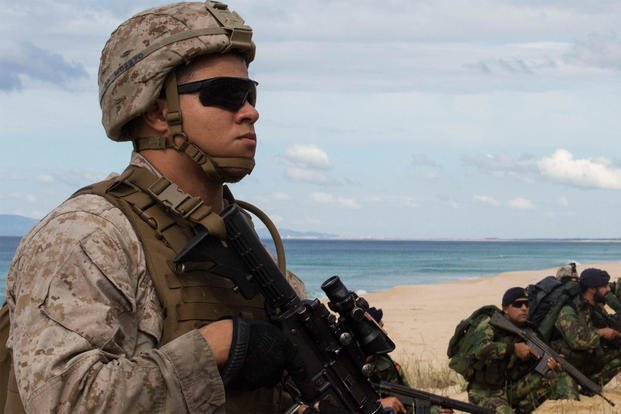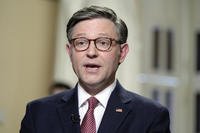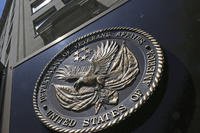The commander of U.S. naval forces in Europe on Friday urged Russian officials to come see for themselves how NATO would respond to aggression by observing the huge Trident Juncture 2018 military exercise beginning later this month.
Trident Juncture 2018, which will feature amphibious landings in Norway by U.S. Marines and allied troops, will "have a deterrent effect on anybody who might think about crossing a contiguous border or violating the sovereignty of a member of the NATO alliance," said Adm. James Foggo, commander of NATO's Allied Joint Force Command, based in Naples.
At a Pentagon briefing, he said Russia has been invited through the Organization for Security and Cooperation in Europe to observe the exercise. Though the Russians have yet to respond to the invitation, "I fully expect they'll want to come. It's in their interests to come. I want them to be there so they can see how well we work together."
Foggo, who will direct the exercise from the U.S. command-and-control ship Mount Whitney, said the exercise will involve all 29 NATO member states, including Turkey, which has recently been at odds with the U.S. and NATO over Ankara's plan to buy S-400 anti-air missiles from Russia. Sweden and Finland will also participate as NATO partner states, he added.
NATO officials have said that Trident Juncture will involve about 40,000 alliance service members, 150 aircraft and 70 warships. Canadian Lt. Gen. Christian Juneau, who served with NATO in Afghanistan, will be in charge of the land component and the amphibious landings of about 5,000 troops in Norway.
Foggo said he views Trident juncture mainly as a logistics exercise to test NATO's ability to insert, supply and maintain a response force coming to the aid of a member state under threat.
"We're going to demonstrate the ability to move that force quickly. That's a message we're going to drive home," he said.
The exercise will take place mostly in central and eastern parts of Norway, and involve air and sea areas in Norway, Sweden and Finland. It will begin with advance activities around Iceland from Oct. 15 to Oct. 17, continuing in and around Norway from Oct. 25 to Nov. 7.
Foggo declined comment on whether Trident Juncture would also feature simulations on deterring nuclear and cyber-attacks but said, "We are always vigilant against attacks in cyberspace."
A submariner, Foggo was also guarded in commenting on increasing activities of Russian submarines in the Baltic Sea and North Sea by new classes of submarines that Moscow claims can run silent to avoid detection. He would say only, "We hold an acoustic advantage, and we will continue to do that. Our subs are the best in the world."
Russia has already condemned Trident Juncture as a needless provocation and warned that its military would take "tit for tat measures."
On Tuesday, Russian Foreign Ministry Spokeswoman Maria Zakharova told Moscow's TASS news agency, "The escalation of NATO's military and political activity in the Arctic region -- namely, in the immediate vicinity of Russia on the territory of northern Norway -- hasn't gone unnoticed."
By hosting the exercise, Norway is "setting the course for unprecedented militarization of its northern latitudes," she said.
Zakharova also took note of the "unfriendly steps" taken by Norway in the recent agreement to boost the rotational number of U.S. Marines in the country for training from 330 to 770. "All these NATO preparations cannot be ignored, and the Russian Federation will take the necessary tit-for-tat measures to ensure its own security," she said.
-- Richard Sisk can be reached at Richard.Sisk@Military.com.











